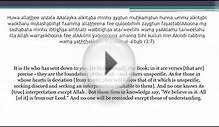
People sometimes tell you you’re misusing a word and cite the Latin origin as proof. Don’t fall for the etymological fallacy. What a word means depends not on its origin, but on how speakers of a language understand it. Over time, words have a way of wandering, and meanings mutate. If you stuck with older meanings of the following words, you could end up in a strange land where “naughty” is the same as “nice” and “awesome” means “terrible.”
1. AWFUL
Ever wonder why “awesome” means excellent but “awful” means really bad when they both derive from “awe”? In Old English, awe meant “fear, terror or dread.” From its use in reference to God the word came to mean “reverential or respectful fear.” By the mid-1700s, awe came to mean solemn and reverential wonder, tinged with fear, inspired by the sublime in nature—such as thunder or a storm at sea. Originally, awful and awesome were synonymous, but by the early 19th century, awful absorbed the negative aspects of the emotion and the word was used to mean frightful or exceedingly bad. The earliest citation in the Oxford English Dictionary for awesome meaning “marvelous, great; stunning or mind-boggling” is from the Official Preppy Handbook, 1980.
2. CHEATER
A cheater was originally an officer appointed to look after the king's escheats—the land lapsing to the Crown on the death of the owner intestate without heirs. As William Gurnall wrote in 1662, “[A] Cheater may pick the purses of ignorant people, by shewing them something like the Kings Broad Seal, which was indeed his own forgery.” Mistrust of the king’s cheaters led the word into its current sense: a dishonest gamester or a swindler.
3. EGREGIOUS
Egregious now describes something outstandingly bad or shocking, but it originally meant remarkably good. It comes from the Latin egregius, meaning "illustrious, select"—literally, "standing out from the flock, " from ex-, "out of, " and greg-, "flock." Apparently the current meaning arose from ironic use of the original.
4. FURNITURE
Furniture originally meant equipment, supplies or provisions, in the literal or figurative sense. For example, in a 1570 translation of Euclid’s Elements of Geometry, there is mention of “Great increase & furniture of knowledge.” Gradually, the meaning narrowed to the current sense: large moveable equipment such as tables and chairs, used to make a house, office, or other space suitable for living or working.
MORE TRANSLATION VIDEO












